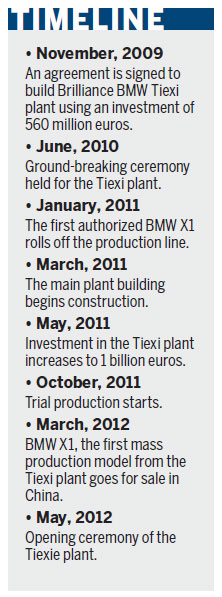Auto Special: BMW stresses sustainable production in its new China plant
|
Robotic arms weld together the frame of a BMW inside the Tiexi factory's body workshop, the most automated section of the plant. Photos Provided to China Daily |
|
The logistics center facilitates storage and transportation. |

BMW Group's new plant in Shenyang, Liaoning province, aims to lead the global auto industry in sustainability, the company's leadership has emphasized.
The BMW Brilliance Tiexi facility was built faster than any other in BMW's history. With an area of more than 2 square kilometers and a total investment of 1.5 billion euros ($1.9 billion) the plant began trial operations in October 2011 while still undergoing construction.
The first phase of its factory is designed to have a yearly production capacity of 100,000 units and is expected to be among the most advanced and sustainable high-end auto manufacturing plants in the world.
To this end, a series of measures have been taken to save energy and cut emissions.
For example, a 2-kilometer energy tunnel, accomplished during the first phase of the plant's construction, gathers all the pipelines into one place, including electricity, water, heat and air-conditioning.
The plant is equipped with specialized waste-recycling facilities and also has a wind power and solar energy facility.
In fact, the idea of sustainability permeates almost every step of production in all sections of the plant.
High-speed pressing
The stamping and pressing workshop is the starting point of the entire production process. Here, 80 kinds of auto parts will be made, including the frame side plate, doors, car roof and engine cover.
After it becomes operational in August, it will be BMW Group's most advanced and efficient stamping and pressing workshop.
Using high-speed servo pressing machines to press highly intensified steel increases the efficiency to triple that of a traditional hydraulic press.
This means that the workshop can not only cut down on the space required by two-thirds but also reduces energy consumption, making manufacturing more flexible.
The servo pressing technology can also reduce noise by 12 decibels.
Body workshop
Hundreds of steel parts are welded at the Tiexi plant's car body assembly workshop. Having as many as 5,000 welding points ensures the car's durability.
The workshop hosts 355 robots, making it one of the most automated sections of the plant. About 95 percent of its work is done by robots.
The production line only has a few workers, who handle the parts that require a human touch and monitor the work of robots.
Due to the demand for growing production capacity at the Tiexi plant, the workshop will expand in the future.
'Perfect paint job'
A key part of BMW Group's sustainable development strategy, the paint workshop will start operation from July 2013 with a designed production capacity of 30 units per hour.
In the workshop, the car body will first have a "bath" to make sure that the car body is dust free.
In pursuit of eco-friendliness and sustainability, water consumption will be reduced by 60 percent at the workshop. Energy consumption will be cut by 65 percent less and emissions by 70 percent.
The whole rotary reverse-dipping transport system can reduce consumption of chemical reagents and mitigate pollution to the environment. The integrated spray craftsmanship can greatly reduce energy use as well.
Distinctive techniques
Pressing, welding and painting are areas in which robots are preferable, but assembly still relies on human labor.
The final assembly workshop has the most workers. Now 1,300 people work there on day and night shifts, and the number will rise to 2,500 in the future.
Current production capacity is 15 units per hour. In future, it is expected to be 60 units per hour.
Each BMW car rolling off the production line at the Tiexi plant is special and tailored for customers' distinctive demands, according to the company's leaders.
The assembly workshop adds "character" to each car, they said.
Before a car can be delivered to the owner, it needs to undergo a series of inspections to make sure it completely meets BMW's quality standards.
Advanced logistics
Next to the final assembly workshop is a logistics center to facilitate storage and transportation.
In the future, railways will be built into the plant, enabling trains to directly bring in needed parts and carry away finished cars .
This will no doubt greatly increase transportation efficiency and significantly reduce carbon emissions.
Meanwhile, packages of the locally made spare parts can be recycled. For packages of imported components, the logistics center staff also picked out parts that can still be potentially recycled.
Plant's 'brain'
The information technology center is the brain of the plant. Every single piece of information related to production will be processed here and can be used whenever needed.
Professional 'circuit'
The best test for a car is to examine its performance on the road. Dynamics is the core of the BMW brand. The testing track at the Tiexi plant is as professional as a real circuit. Other than Tiexi, only BMW's plants in Spartanburg and Munich have similar testing grounds.
Training
Brilliance BMW has a complete training system. Every new front-line worker must have six weeks of full-time training, including theory, practice and exams.
Excellent workers are usually sent to the BMW Germany headquarters to have training that lasts from a month to a year.
Heart of BMW cars
Part of the Tiexi facility, Brilliance BMW's powertrain plant is the group company's fourth facility of its kind worldwide and also the first outside of Europe.
With an area of 30,000 sq m, it has a total investment of 50 million euros and a planned annual production capacity of 200,000 units. It mainly produces BMW's latest in-line four-cylinder N20 engine, which will be found in Brilliance BMW's full line-up in the future.
xuxiao@chinadaily.com.cn
(China Daily 05/24/2012 page15)
















